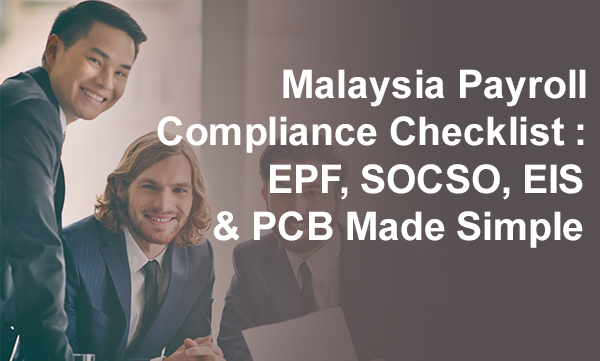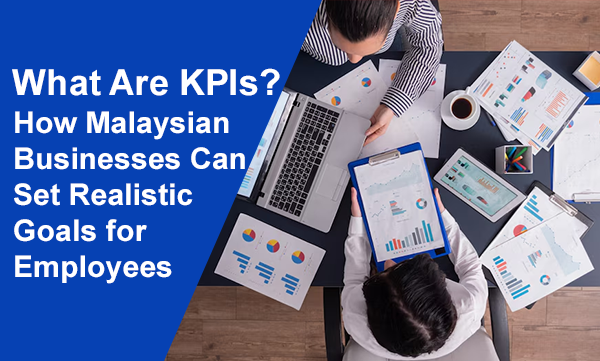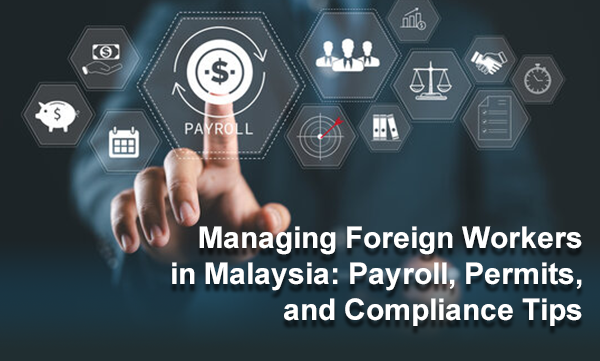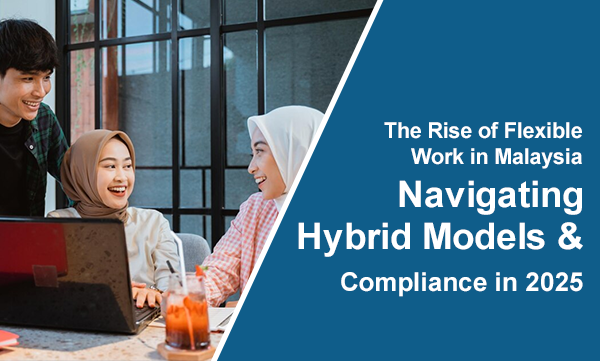
Malaysia Payroll Compliance Checklist: EPF, SOCSO, EIS & PCB Made Simple
Ensuring payroll compliance in Malaysia isn’t just about paying your employees on time — it’s about meeting strict legal obligations set by statutory bodies. From EPF contributions to PCB tax deductions, Malaysian employers must stay on top of monthly and yearly requirements to avoid fines, audits, or reputational damage.
Yet, many businesses — especially SMEs — struggle to keep up with these evolving rules. This guide breaks down the essentials of Malaysia’s payroll compliance in a simple checklist format, so you can focus on running your business without worrying about legal missteps.
1. EPF (Employees Provident Fund) Contributions
Every employer in Malaysia is required to contribute to the Employees Provident Fund (EPF) for their eligible employees. EPF is a mandatory retirement savings scheme, and failure to comply can lead to prosecution under the EPF Act 1991.
Current Rates (2025):
Employee contribution:
11% of monthly wages
Employer contribution:
13% for employees earning RM5,000 and below
12% for employees earning above RM5,000
Due Date:
Contributions must be paid by the **15th of each month**. Missing deadlines triggers late payment charges of up to **6% per annum** and possible court action. View official EPF contribution rates ➜
2. SOCSO (Social Security Organisation) Contributions
SOCSO provides social security protection to employees against workplace injuries, invalidity, and more. Employers must register employees and contribute based on the SOCSO Contribution Table.
Schemes Covered:
Employment Injury Scheme
Invalidity Scheme
Contribution Rates:
Rates vary between 1.25% to 1.75% (employer share) depending on wages, plus a small employee share.
Due Date:
Payment is due by the 15th of the following month.
Non-compliance can result in fines up to RM10,000 or imprisonment.
Check SOCSO contribution details ➜
3. EIS (Employment Insurance System) Contributions
The EIS protects employees who lose their jobs, offering financial assistance and job placement programs.
Contribution Rate:
Both employer and employee contribute 0.2% of the employee's monthly wages.
Who Must Contribute:
All Malaysian employees aged 18 to 60, except for permanent government staff and domestic workers.
Due Date:
Same as SOCSO — by the 15th of every month.
Late payments will incur pen>alties, similar to SOCSO enforcement actions.
Learn more about EIS ➜
4. PCB (Potongan Cukai Bulanan / Monthly Tax Deduction)
PCB is Malaysia’s version of PAYE (Pay-As-You-Earn) income tax. Employers are responsible for deducting the correct amount of income tax from employees’ salaries each month and submitting it to LHDN.
Key Compliance Points:
Use the official LHDN PCB schedule or approved payroll software for calculations.
Include all taxable benefits (allowances, bonuses, commissions).
Issue EA Forms to employees by end of February each year for annual tax filing.
Due Date:
Submit PCB deductions by the 15th of every month.
Failure to deduct or late submissions can lead to penalties of 10% of the unpaid amount, plus additional charges for ongoing delays.
5. Additional Compliance Reminders
Register New Employees Promptly with EPF, SOCSO, and EIS within 30 days of hiring.
Maintain accurate payroll records for at least 7 years as per LHDN requirements.
Ensure foreign workers are covered under the correct SOCSO schemes.
Use approved, automated payroll software to handle statutory calculations and avoid manual errors.
Why Payroll Automation Matters for Compliance
With multiple deadlines, varying contribution rates, and frequent regulatory updates, manual payroll processing is risky and time-consuming. Malaysian businesses are increasingly turning to automated payroll solutions to stay compliant effortlessly.
A cloud-based system like HR2eazy ensures:
Real-time statutory updates (EPF, SOCSO, EIS, PCB)
Auto-generated reports for LHDN and other bodies
Timely reminders for payment deadlines
Reduced risk of human error
Free Malaysia Payroll Setup (Year-End Offer)
Staying compliant with EPF, SOCSO, EIS & PCB is mandatory — but manually handling all deadlines, rates and submissions is time-consuming and risky for Malaysian businesses.
That’s why HR2eazy, an all-in-one HR & payroll software in Malaysia, is offering FREE year-end setup support including:
Free Onboarding
Free Data migration
Free Implementation
Automate statutory payroll compliance, avoid penalties, and start January stress-free.
Conclusion: Stay Ahead of Payroll Compliance in Malaysia
Payroll compliance isn’t optional — it’s a legal responsibility. By following this checklist, Malaysian employers can avoid penalties, maintain good standing with statutory bodies, and build trust with employees through accurate, timely salary management.
If managing payroll feels overwhelming, it’s time to simplify the process.
Ensure Compliance the Easy Way
Need help simplifying Malaysia payroll compliance? Learn how an automated system can handle statutory contributions and deadlines for you. Let HR2eazy handle your statutory contributions and payroll compliance with our automated solutions tailored for Malaysian businesses.
Book a free demo today and never miss a deadline again.
Sources:
Employees Provident Fund (EPF) Malaysia
SOCSO Official Website (PERKESO)
Employment Insurance System (EIS) - PERKESO
LHDN Malaysia - PCB Guidelines
EPF Act 1991


